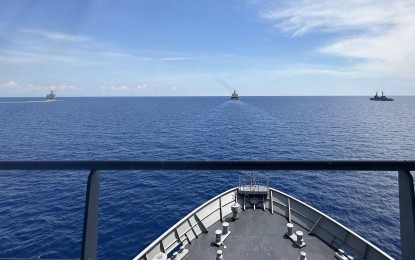
MULTILATERAL MARITIME DRILL. The formation of ships from the Philippines, US and France during the multilateral maritime exercise" (MME) of this year's "Balikatan" drills on April 29, 2024. Defense Secretary Gilberto Teodoro Jr. on Friday (May 10) said the next edition of the annual US-Philippines "Balikatan" exercises will see heightened action through more realistic scenarios and full battle simulations. (Photo courtesy of AFP Western Command)
MANILA – Defense Secretary Gilberto Teodoro Jr. on Friday said the next edition of the annual US-Philippines "Balikatan" exercises will see heightened action through more realistic scenarios and full battle simulations.
In his speech at the closing rites in Camp Aguinaldo, Quezon City, the defense chief also extended President Ferdinand R. Marcos Jr.'s well wishes to all participants of the three-week drills.
"He (Marcos) looks forward to next year's exercise which will be, I believe, a full battle simulation which will put to the test the combined capabilities in the most realistic of scenarios possible with safety in mind," Teodoro said.
The DND chief also applauded the drills which concluded without untoward incidents.
"That's not easy, given the El Niño period now. It probably posed a significant challenge in operating, particularly to those on the ground," Teodoro said.
Some 16,000 Filipino and American soldiers took part in the exercises which started on April 22.
Teodoro also echoed the observation made by Armed Forces of the Philippines (AFP) chief Gen. Romeo Brawner Jr. and US Ambassador to the Philippines MaryKay Carlson that it had been a productive year for bilateral and multilateral cooperation between Manila and Washington, D.C. and their allies, such as Australia, Japan, France, India, Canada, and other "like-minded nations."
This came following the trilateral summit among the Philippines, US, and Japan, where key defense and security officials also tackled mutual concerns.
"And we look forward to exercises such as this where at least on the Philippine side, we go out of our normal comfort zone and try to focus on actual soldiering which is what an armed forces need (to be doing) and after this exercise both sides will go back to the drawing board," he added.
Teodoro said Marcos is waiting for an "extensive debrief" of the "Balikatan" successes, aside from the gaps that need to be filled in terms of interoperability, human resources capabilities and sustainment.
Such things are important for the continuation of bilateral and multilateral cooperation of the Philippines with its allies, he added.
"We have also witnessed on the Philippine side the shift towards, as I said, getting out of their comfort zones and I have told the AFP that we will be increasing the pressure continuously for them to evolve as soon as possible into a multi-threat, multi-theater operating armed force consistent with the archipelagic doctrine nature of our country and the necessity for defending it in a proactive and not a passive manner," Teodoro said.
During the drills, participating forces engaged in various training scenarios throughout the exercise to enhance interoperability and readiness across critical areas such as external defense operations, cyber defense, counter-terrorism, humanitarian assistance and disaster response, and inter-agency capacity-building.
This year’s exercise highlighted the combined capabilities of the AFP and the US Armed Forces in addressing complex security challenges through the information warfighter exercise (IWX) that empowered military planners to set the standard for future local IO training programs.
The first-ever multilateral maritime exercise marked a historic milestone in regional cooperation, providing participating countries with invaluable knowledge to propel their naval forces.
In addition, demonstrating proficiency in maritime defense tactics and promoting peace, the counter landing live fire exercise and maritime strike exercise showcased the combined capabilities of the AFP and the US Armed Forces in addressing complex security challenges.
The humanitarian civic action program also extended crucial assistance to over 23,000 Filipino citizens, contributing to nationwide projects and training events.
AFP chief Gen. Romeo Brawner Jr. said the exercise reaffirmed the strong bond between the two armed forces and their commitment to uphold peace, security, and prosperity in the Indo-Pacific Region.
“I expressed our deepest gratitude for the continuing learning and collaboration. To every soldier, airman, sailor, and marine from all the participating countries, I hope you optimized your takeaways from this year’s Balikatan exercise and utilized this in a more informative and productive Balikatan exercise in the future,” he added. (PNA)
